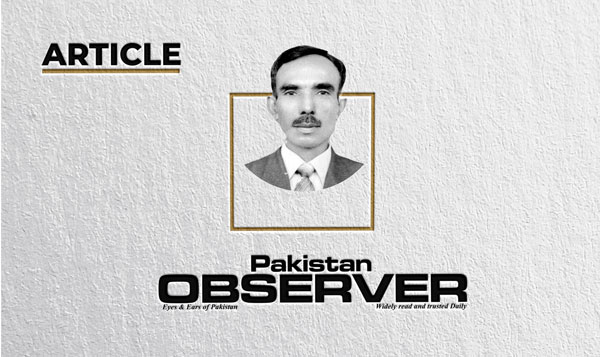Kashmir Solidarity Day revisited
EVERY year, Kashmir Solidarity Day is observed on 5 February by people throughout Pakistan and Azad Jammu & Kashmir to express country’s unwavering political, moral and diplomatic support to the just struggle of Kashmiri brethren, as enshrined in the UN Charter and relevant UN resolutions. 5th February symbolizes Pakistan’s deep-rooted relationship with Kashmir.
Every year, this day revives the cultural, religious and the geographical proximity the valley enjoys with Pakistan. In order to maintain its illegal control, India has continued its repressive regime in the IIOJK through various machinations. Indian Constitution which claims India to be a secular state was torn into pieces on August 5, 2019 when Modi-led Indian extremist government revoked articles 35A and 370 of the Constitution, which gave a special status to the disputed territory of the IIOJK. Indian government bifurcated Jammu and Kashmir into two union territories—Jammu and Kashmir and Ladakh to be ruled by the federal government. On the same day, strict military lockdown was imposed in the IIOJK which continues unabated. In fact, the very tragedy of Kashmiris had started after 1947 when they were denied their genuine right of self-determination. They organised themselves against the injustices of India and launched a war of liberation which New Delhi tried to suppress through various forms of state terrorism.
Since 1989, various forms of state terrorism have been part of a deliberate campaign by the Indian army and paramilitary forces against Muslim Kashmiris. It has been manifested in brutal tactics like crackdowns, curfews, illegal detentions, massacre, targeted killings, sieges, burning the houses, torture, disappearances, rape, breaking the legs, molestation of Muslim women and killing of persons through fake encounters. The deployment of more than 900,000 military troops in the IIOJK, who have martyred tens of thousands of the Kashmiris, including women and children through brutal tactics-fake encounters, while closure of mosques, shortage of foods, medicines for the patients have further increased the plight of the Kashmiris. Indian forces have been also availing various draconian laws such as Armed Forces Special Powers Act (AFSPA), the Public Safety Act (PSA) etc. in martyring the Kashmiri people, and for arbitrarily arrest of any individual for an indefinite period. While, under a well-planned hidden agenda, Modi-led regime has intensified, bringing demographic changes in the IIOJK.
In this context, India’s various moves such as amendment of the law, allowing Indian citizens to buy land in the IIOJK, issuance of domicile certificates to more than 800000 non-Kashmiris, registration of almost 2.5 million new non-local voters in the IIOJK etc, might be cited as instance. Notably, during the partition of the sub-continent, the people of the state of Jammu and Kashmir (J&K) which comprised Muslim majority decided to join Pakistan. But, Dogra Raja, Sir Hari Singh, a Hindu who was ruling over the J&K in collusion with the Indian Prime Minister Jawaharlal Nehru and Governor General Lord Mountbatten joined India.
The Radcliffe Boundary Award gave the Gurdaspur District—a majority Muslim area to India to provide a land route to the Indian armed forces to move into the J&K. Indian forces invaded Srinagar on October, 27 1947 and forcibly occupied the J&K in utter violation of the partition plan. When Pakistan responded militarily, on December 31, 1947, India made an appeal to the UN Security Council to intervene and a ceasefire ultimately came into effect on January 01, 1949, following UN resolutions calling for a plebiscite in Kashmir.
The Security Council adopted resolution of April 21, 1948, which promised a plebiscite under UN auspices to enable the people of Jammu & Kashmir to determine whether they wish to join Pakistan or India. On February 5, 1964, India backed out of its commitment of holding plebiscite. Instead, Indian Parliament declared Kashmir as an integral part of the Indian union.It is noteworthy that a year after India abrogated the special status of Jammu and Kashmir, UN human rights experts on August 4, 2020 called on India and the international community to take urgent action to address the “alarming” human rights situation in Jammu and Kashmir—“to investigate all cases of human rights violations, including extrajudicial killings, enforced disappearances, torture and arbitrary detentions.” Amnesty International also said on September 29, 2020 that it is “stopping its work in India because the government has frozen its bank accounts” on September 10 for highlighting rights violations in Jammu and Kashmir” and “govt had sought to punish it for that”.
In the recent past, the UN Security Council in its meetings has thrice reiterated that the Kashmir issue requires to be settled in accordance with the principles of the UN charter and the related Security Council resolutions.
Recently, the UN General Assembly has adopted Pakistan-sponsored resolution on “Universal Realization of the Right of the People to Self-determination with the consensus of 72 countries. On this day, special transmissions were broadcast on media in order to highlight Kashmir cause. However, current situation in the IIOJK is worst in recent history, as through continuous illegal and unilateral steps, Narendar Modi’s government has created an environment of fear and chaos for the Kashmiris.
Pakistanis and Kashmiris, living abroad raised Indian atrocities and continued struggle for the Kashmiris’ legitimate right of self-determination on various international forums. Particularly, Pakistan’s missions abroad also commemorate special events to inform international community regarding persecution faced by Kashmiris under the illegal Indian occupation. Nonetheless, the 5th of February is being observed as the Kashmir Solidarity Day to pay homage to Kahsmiri martyrs and to show solidarity with the freedom fighters who continue war of liberation, demanding their legitimate right of self-determination, as recognized by the UN resolutions.
—The writer is contributing columnist, based in Lahore.










